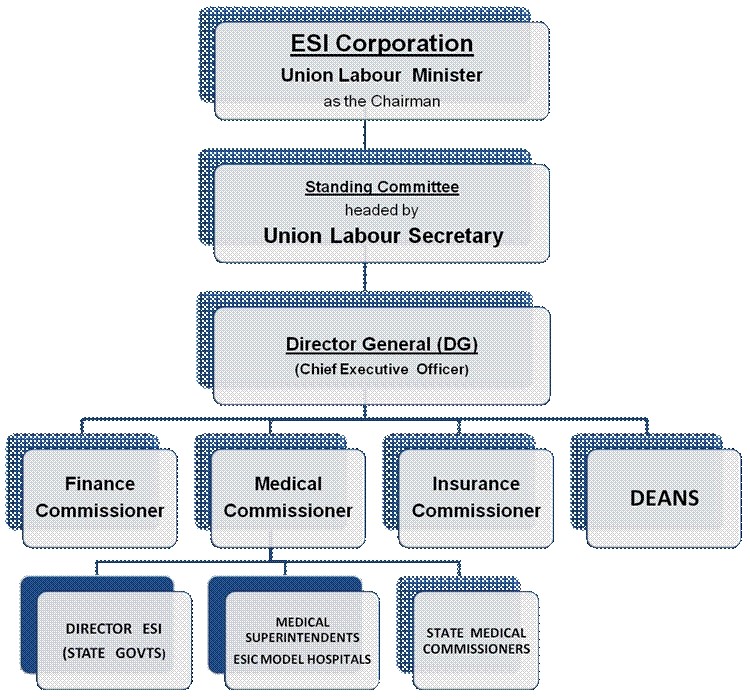History of ESICEmployees' State Insurance (abbreviated as ESI) is public social security and health insurance fund for Indian workers. The fund is managed by the Employees' State Insurance Corporation (ESIC) according to rules and regulations stipulated in the ESI Act 1948. ESIC is a Statutory and an Autonomous Body under the Ministry of Labour and Employment, Government of India.
History
In March 1943, Prof. B.P.Adarkar was appointed by the Government of India to create a report on the health insurance scheme for industrial workers. The report became the basis for the Employment State Insurance (ESI) Act of 1948. The promulgation of the Employees’ State Insurance Act, 1948 envisaged an integrated need based social insurance scheme that would protect the interest of workers in contingencies such as sickness, maternity, temporary or permanent physical disablement, death due to employment injury resulting in loss of wages or earning capacity. The Act also guarantees reasonably good medical care to workers and their immediate dependents. Following the promulgation of the ESI Act the Central Govt. set up the ESI Corporation to administer the Scheme. The Scheme thereafter was first implemented at Kanpur and Delhi on 24 February 1952. The Act further absolved the employers of their obligations under the Maternity Benefit Act, 1961 and Workmen's Compensation Act 1923. The benefits provided to the employees under the Act are also in conformity with ILO conventions.
The act was initially intended for factory workers but later became applicable to all establishments having 10 or more workers. As on 31 March 2016, the total beneficiaries are 82.8 million.
Powers and Duties of ESICPowers of the Corporation
- The ESI Corporation has extensive powers to carry out its functions and duties under the Act.
- Firstly, Section 17 allows the Corporation to appoint staff members and officers for carrying out its business effectively. It may bestow provident fund, gratuity and other similar benefits on its staff.
- Secondly, the Corporation has powers to purchase and sell movable as well as immovable properties. It can even raise loans and invest its money with the Central Government’s sanction.
- In order to ensure compliance with provisions of the Act, the Corporation can appoint Social Security Officers. These officers function in their local limits and exercise jurisdiction over factories and establishments therein.
- All employers to whom this Act applies have to pay some contribution for the benefit of employees. The Corporation has powers to determine how much this contribution should be.
- The Director-General of the Corporation has to sign on every decision it takes. He may appoint some other officer on his behalf to carry out this task.
Duties of the Corporation
- The Corporation performs many important duties under this Act. Most of these duties are in the nature of compliances relating to its functioning and decisions.
- For example, every year the Corporation has to make a budget of its probable income and expenditure. It has to submit this report to the Central Government for its approval.
- Furthermore, it has to maintain accounts of its incomes and expenses in the format that the Central Government prescribes. None other than the Comptroller & Auditor General (CAG) of India audits these accounts every year.
- Other compliances of the Corporation include submission of annual reports of its activities to the Central Government. Apart from these, it has to appoint a valuer to value its assets and liabilities every three years.
Organsaition of ESICESI Corporation - Organisational Structures
- The Employees’ State Insurance Corporation (ESIC) is a statutory body constituted under the administrative control of Ministry of Labour & Employment, Government of India.
- Union Minister of Labour functions as Chairman of the ESI Corporation
- Standing Committee is the executive body of the ESIC, headed by Union Labour secretary to take up policy matters before sending to ESI Corporation.
- The Standing Committee, which is the Decision making body, has representatives from Central and State Governments, Employers, Employees, Parliament and the Medical professionals.
- The Director General, appointed by the Union Government functions as it’s Chief Executive Officer
